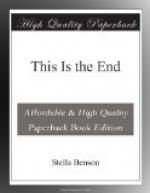BY STELLA BENSON
1917
This is the end, for the moment, of all my thinking, this is my unfinal conclusion. There is no reason in tangible things, and no system in the ordinary ways of the world. Hands were made to grope, and feet to stumble, and the only things you may count on are the unaccountable things. System is a fairy and a dream, you never find system where or when you expect it. There are no reasons except reasons you and I don’t know.
I should not be really surprised if the policeman across the way grew wings, or if the deep sea rose and washed out the chaos of the land. I should not raise my eyebrows if the daily press became the Little Sunbeam of the Home, or if Cabinet Ministers struck for a decrease of wages. I feel no security in facts, precedent seems no protection to me. The wisdom you can find in an Encyclopedia, or in Selfridge’s Information Bureau, seems to me just a transitory adaptation to quicksand circumstances.
But if the things which I know in spite of my education were false, if the eyes of the sea forgot their secret, or if the accent of the steep woods became vulgar, if the fairy adventures that happen in my heart fell flat, if the good friends my eyes have never seen failed me,—then indeed should I know emptiness, and an astonishment that would kill.
I want to introduce you to Jay, a ’bus-conductor and an idealist. She is not the heroine, but the most constantly apparent woman in this book. I cannot introduce you to a heroine because I have never met one.
She was a person who took nothing in the world for granted, but as she had only a slight connection with the world, that is not saying very much. Her answer to everything was “Why?” The fundamental facts that you and I accept from our youth upwards, like Be Good and You Will Be Happy, or Change Your Boots When You Come In Out Of The Wet, or Respect Your Elders, or Love Your Neighbour, or Never Cross Your Legs Above The Knee, did not impress Jay.
I never knew her as a baby, but I am sure she must have been born a propounder of questions, and a smiler at the answers she received. I daresay she used to ask questions—without result—long before she could talk, but I am quite sure she was not embittered by the lack of result. Nothing ever embittered Jay, not even her own pessimism. There is a finality about bitterness, and Jay was never final. Her last word was always on a questioning note. Her mind was always open, waiting for more. “Oh no,” she would tell her pillow at night, “there must be a better answer than that ...”
Perhaps it is hardly necessary to add that she had quarrelled with her Family, and run away from home. Her Family knew neither what she was doing nor where she was doing it. Families are incurably conceited, and this one supposed that, having broken away from it, Jay was going to the bad. On the contrary, she was a ’bus-conductor, but I only tell you this in confidence. I repeat the Family did not know it, and does not know it yet.




